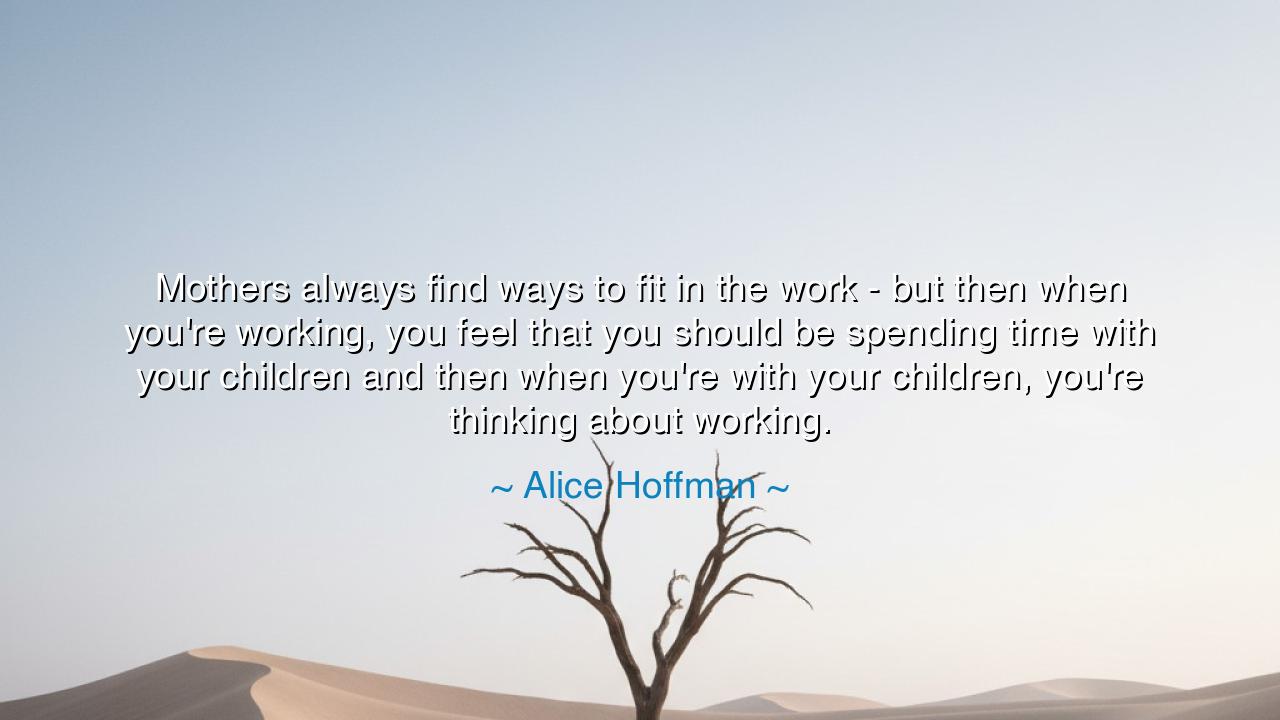
Mothers always find ways to fit in the work - but then when
Mothers always find ways to fit in the work - but then when you're working, you feel that you should be spending time with your children and then when you're with your children, you're thinking about working.






In the words of Alice Hoffman, “Mothers always find ways to fit in the work—but then when you’re working, you feel that you should be spending time with your children, and then when you’re with your children, you’re thinking about working.” Within these words lies the eternal ache of the mother’s paradox, the unending dance between duty and devotion. It is not a complaint, but a confession of the human heart caught between two worlds—one calling for responsibility, the other for love. Hoffman, known for weaving the mystical and the ordinary together, captures here a truth that transcends time: that the life of a mother is a constant act of balance between giving to the world and giving to her own.
From the dawn of civilization, women have carried the double burden of creation and labor. The ancient mothers worked the fields and raised the children, spun the cloth and told the stories, baked the bread and healed the sick. Their hands built nations while their hearts built souls. Hoffman’s words echo their silent endurance: the ceaseless effort to “fit in the work”, to meet the world’s demands while still nurturing the sacred bond between mother and child. She names the invisible weight that countless women have borne—the guilt that no matter where they stand, one half of their soul seems to ache for the other.
Consider the story of Sojourner Truth, born into slavery, who toiled both as a laborer and a mother under unimaginable conditions. She worked the fields by day, and by night sought the freedom of her children—some sold, some lost, yet never forgotten. Her hands served her oppressors, but her heart served a higher calling. When she later stood before crowds to speak the words, “Ain’t I a woman?”, she gave voice to this duality: the woman who works, the mother who loves, and the soul that must endure both at once. Her life was the living embodiment of Hoffman’s truth—the burden of divided devotion, and the power that comes from carrying it with grace.
The conflict of the mother’s heart is not born from failure, but from love’s abundance. Only those who care deeply can feel torn between paths. To work is to secure the future; to stay is to nurture the present. One act feeds the body, the other the spirit. Hoffman’s insight reminds us that this restlessness is not a flaw—it is the heartbeat of motherhood itself, proof that a mother’s love reaches in all directions at once. She is not split by her responsibilities; she is expanded by them, though at times it feels as though her soul stretches to breaking.
There is a deep nobility in this struggle. The mother who leaves her child to labor is no less loving; the mother who pauses her work to hold her child is no less ambitious. The ancients would have seen in her the reflection of Demeter, the goddess who mourned her lost daughter yet nourished the world. Her sorrow became the seasons, her love became the harvest—so too does every working mother transform her longing into life itself. The tension between work and love becomes her sacred rhythm, her offering to the world.
And yet, there is wisdom here for all who listen. The lesson Hoffman leaves us is not merely sympathy for mothers, but awareness for all: that balance is not perfection, and guilt is not proof of failure, but of caring deeply. In a world that demands too much, the act of doing both—working and loving—is itself an act of quiet heroism. The mother who forgives herself for not being everywhere at once begins to find peace; she learns that presence is not measured by hours, but by the tenderness she brings to each moment she has.
Let this teaching endure: to live divided is the condition of love. Those who give of themselves will always feel the pull of what they leave undone. The secret, then, is not to silence the conflict, but to honor it—to let it remind you of what truly matters. Whether you are a mother, a father, or a soul bound by duty and devotion alike, learn to be gentle with yourself. Do the work when it is time to work, love when it is time to love, and trust that your heart, though torn, is whole. For in that wholeness lies the quiet strength that has moved humanity forward since time began—the strength of those who, like Alice Hoffman’s mother, keep finding ways to fit in the work, and to love beyond measure.






AAdministratorAdministrator
Welcome, honored guests. Please leave a comment, we will respond soon